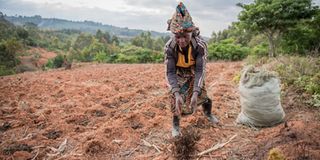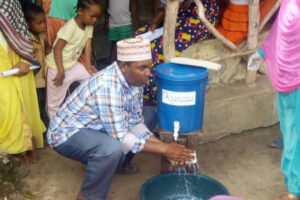Tanzania’s population is projected to reach 80 million by 2034 – a 30 percent increase from the 61.7 million recorded in the 2022 census. With a growing population, Tanzania’s smallholder farmers – who produce most of our food – are under increasing pressure to grow more with fewer resources. However, farmers grapple with a silent but critical issue: soil degradation. Season after season, despite applying increasing amounts of fertiliser, many farmers are still experiencing average to low productivity. The problem lies beneath the surface – soils that have become acidic and depleted of organic nutrients.
According to the World Bank, about 50 percent of Tanzania’s soil is degraded. Monoculture, climate change, and the excessive and improper use of chemical fertilisers have led to nutrient depletion, soil erosion, and biodiversity loss.
Healthy soils are vital for agricultural productivity. They retain moisture, provide essential nutrients, and support plant growth. The future of Tanzania’s food security depends on improving soil health. At One Acre Fund, where I work, we have seen first-hand how critical it is to help farmers adopt practices that restore soil vitality. Tanzanian farmers can increase productivity and create more sustainable farming systems by integrating soil health management practices such as soil testing, liming, composting, and manuring.
Listed below are opportunities for improving soil health:
Scaling up soil testing and tailored interventions
One of the major challenges Tanzanian farmers face is the lack of knowledge about their soil’s nutrient status. Without soil testing, many farmers apply fertilisers inefficiently, leading to waste and a higher cost of production. Over time, fertiliser overuse or misuse can also degrade soil health, accelerating nutrient depletion and making fields less productive.
Soil testing is a key solution. It helps identify specific nutrient deficiencies, allowing farmers to tailor their fertiliser applications and other inputs to their soil’s needs. This approach ensures that farmers are optimising their inputs and preserving soil fertility for the long term.

One Acre Fund farmer Huluma Mhapa from Mhaji Village in Wanging’ombe District, Njombe Region, applies manure in the field before planting maize. PHOTO|COURTESY
Recognising the importance of soil testing, the Tanzanian government, in collaboration with One Acre Fund, has actively promoted soil testing services. Farmers have successfully adopted customised fertilisation strategies in districts like Wanging’ombe and Kilolo, where One Acre Fund has conducted extensive soil testing, leading to better soil management. Despite these efforts, farmers in other regions still lack access to soil testing services. Expanding access is critical, and efforts are underway, such as providing agricultural extension workers with soil scanners, motorcycles, and tablets to better serve rural communities. In the 2024/2025 fiscal year, the government plans to scale up these services further.
Promoting organic inputs and lime usage
While fertilisers have boosted agricultural productivity, relying solely on chemical fertilisers can lead to imbalanced soil health. Farmers need to adopt a more holistic approach, incorporating organic inputs such as compost and manure, which provide immediate nutrient availability and long-term soil enrichment. These organic materials improve soil structure, enhance water retention, and support microbial activity—factors that are crucial given Tanzania’s increasingly erratic rainfall patterns.
Soil acidity is another major issue in many regions of Tanzania. Acidic soils reduce the availability of nutrients, hindering plant growth and reducing yields. Lime application is an effective solution for neutralising this problem, making essential nutrients more accessible to crops. When combined with compost and manure, lime helps create a balanced, nutrient-rich environment that promotes healthier and more productive soils.
In collaboration with the Tanzanian government, One Acre Fund has initiated campaigns to raise awareness about the benefits of these practices. For example, in Kondoa District Council, we distributed over 20 metric tons of lime free of charge as part of an awareness campaign linked to our soil testing efforts. These initiatives are helping farmers improve soil management, but much more needs to be done to ensure the widespread adoption of sustainable practices.
Encouraging sustainable agricultural practices
Farmers must adopt practices such as crop rotation, intercropping, and conservation agriculture to address soil degradation effectively. Crop rotation helps maintain soil fertility by alternating crops with different nutrient needs while intercropping reduces erosion by providing continuous soil cover. Conservation agriculture—characterised by minimal tillage, permanent soil cover, and diverse crop rotations—promotes soil health by reducing erosion and improving soil structure.
Agroforestry, the practice of planting trees among crops, offers additional benefits by improving soil fertility, enhancing biodiversity, and providing crop shade. Organic farming practices, including the use of natural fertilisers and biological pest control, further promote soil health while minimising environmental harm. Farmers can reduce soil degradation, improve productivity, and ensure environmental sustainability by adopting these sustainable practices.
It is crucial to prioritise soil health interventions to reverse the trend of soil degradation and unlock the full potential of Tanzania’s farmlands. Sensitising farmers to the importance of soil testing—and ensuring they understand how it can help them apply the right inputs at the right time—is a critical first step.
Aligning the efforts and resources of stakeholders across the agricultural sector will help scale up access to soil testing, ensure the responsible use of inputs, and build resilient farming systems. Through awareness, collaboration, and sustainable practices—we can secure fertile, productive soils that will support farmers and nourish communities for generations to come.
Nelson Musikula is a Government Relations Senior Associate at One Acre Fund














